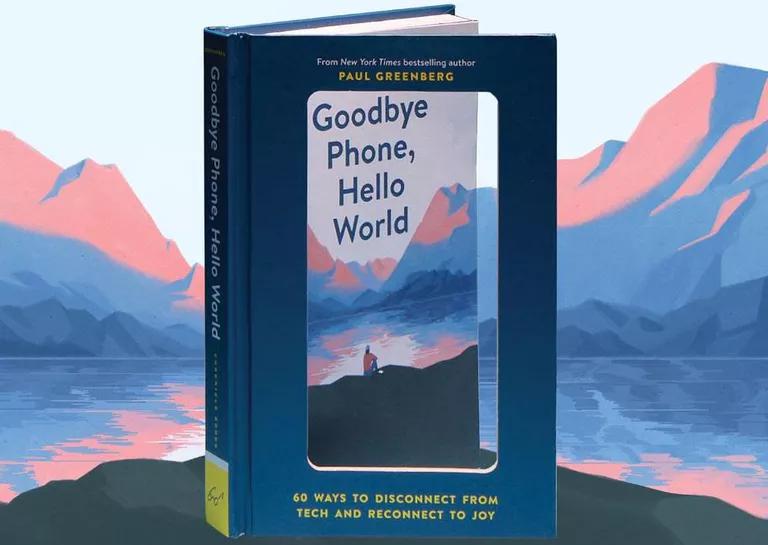再见电话,你好世界(书评)
When Paul Greenberg's son turned 12, Greenberg had something of a crisis. He realized he'd spent a disproportionate amount of time during his son's childhood staring at a smartphone screen, pouring attention into a device that could have been directed toward his child.
当保罗·格林伯格的儿子12岁时,格林伯格遇到了某种危机。他意识到,在儿子的童年时期,他花了过多的时间盯着智能手机屏幕,把本可以指向孩子的注意力都集中在设备上。
At the same time, his almost-teenage son was asking for a smartphone of his own. The son challenged Greenberg's reasons for why it wasn't a good idea, pointing out the hypocrisy of his dad's own addiction to his phone. That's when Greenberg decided to take a radical step, replacing his smartphone with an old-fashioned flip phone and focusing on spending time with his son.
与此同时,他快十几岁的儿子想要一部属于自己的智能手机。格林伯格的儿子质疑了他为什么认为这不是一个好主意的原因,并指出他父亲对手机上瘾是虚伪的。就在那时,格林伯格决定采取一项激进的举措,把智能手机换成老式翻盖手机,专注于陪儿子。

Courtesy of Chronicle Books
Greenberg ended up writing a delightful book about the transition, called "Goodbye Phone, Hello World: 60 Ways to Disconnect from Tech and Reconnect to Joy" – but it's different from what you might expect. It's not a philosophical treatise on the evils of technology, but a fairly short, succinct, and practical guide on how actually to live without a smartphone – namely, all the wonderful, amazing things you can do when you're not throwing away four hours per day (the American average) on a screen doing mostly useless things. It's upbeat, positive, and proactive.
格林伯格最后写了一本关于这种转变的令人愉快的书,书名为《再见电话,你好世界:60种脱离科技和重新连接到快乐的方法》——但它可能和你想象的不一样。这不是一篇关于科技罪恶的哲学论文,而是一本相当简短、简洁、实用的指南,告诉你在没有智能手机的情况下如何生活——也就是说,当你不用每天花4个小时(美国人的平均水平)在屏幕上做一些无用的事情时,你可以做所有美妙、神奇的事情。它是乐观的、积极的、主动的。
The book is divided into chapters that explore the various aspects of your life that will improve when you reallocate your time, such as finding a sense of purpose, strengthening mind and body, building better relationships with friends, family, and lovers, and healing the environment. But first, it opens with a reassuring message that our screen addiction is not so much a result of weakness, but rather a carefully concocted plan by a slew of computer scientists far more knowledgeable than we are about our own brains and instincts:
这本书分为几个章节,探索你生活的各个方面,当你重新分配你的时间时,这些方面会改善你的生活,比如找到目标感,增强身心,与朋友、家人和爱人建立更好的关系,以及治愈环境。但首先,它以一个令人安心的信息开篇,即我们的屏幕瘾与其说是软弱的结果,不如说是一群计算机科学家精心策划的计划,这些科学家对我们的大脑和本能的了解远远超过我们:
"I wanted to tell [my son] what Cal Newport had said in Digital Minimalism, that 'people don’t succumb to screens because they’re lazy, but instead because billions of dollars have been invested to make this outcome inevitable.' I wanted to tell him that when you look into your phone, you think it’s just your two eyes looking at a screen. What’s really happening is that 10,000 programmers’ eyes are looking back at you, following you, tailoring your environment so that you’ll keep looking."
“我想告诉(我的儿子)在数字极简主义中说过的话:‘人们屈服于屏幕并不是因为他们懒惰,而是因为数十亿美元的投资使这一结果不可避免。我想告诉他,当你看手机时,你会觉得只是你的两只眼睛在看屏幕。真正发生的是,一万名程序员的眼睛正在看着你,跟随你,调整你的环境,以便你继续寻找。”
That's not an excuse for complacency, though. You can quit, opt out, refuse to play the game; and when you do, doors of opportunity open all around.
不过,这并不是自满的理由。你可以退出,选择退出,拒绝玩游戏;当你这样做时,机会之门会向你敞开。
What about the naysayers who think you'll become disconnected from others? Greenberg recalls all the places he went in a pre-smartphone era. His words made me smile as I read, "One July day, long before the smartphone, I asked my friend Molly to meet me at 11:00 a.m. on the ninth of September in the Piazza Margana in Rome. She was there." Oh, to plan in advance ... those days seem long gone, but we can still do it if we choose to.
那些认为你会与他人隔绝的反对者怎么办?格林伯格回忆起他在智能手机时代之前去过的所有地方。他的话让我不禁莞尔一笑:“7月的一天,早在智能手机出现之前,我让我的朋友莫莉在9月9日上午11点在罗马玛尔卡纳广场见我。她及时到了那里。”噢,提前计划……那些日子似乎已经远去,但如果我们选择,我们仍然可以做到。
The chapter on finding purpose hones in on building skills and engaging in hobbies that perhaps we once loved, like playing music or making art, and then implementing a regular practice schedule. The chapter on strengthening the mind emphasizes the importance of good sleep hygiene, of allowing ourselves empty mental time to stimulate creativity, of learning how to read lengthy (paper) books once again.
关于寻找目标的那一章着重于培养技能,从事我们曾经热爱的爱好,比如演奏音乐或创作艺术,然后实施一个有规律的练习计划。加强思维的那一章强调了良好的睡眠卫生的重要性,让我们有空闲的思维时间来激发创造力,以及学习如何再次阅读长篇(纸质)书籍的重要性。
The chapter on physical health encourages quitting exercise apps because they can actually have a reverse placebo effect called a "nocebo," where "individuals reward themselves with extra food when their app tells them they met a goal [and this] negates their effort."
关于身体健康的那一章鼓励人们放弃锻炼应用程序,因为它们实际上会产生一种叫做“反安慰剂”的反向安慰剂效应,即“当应用程序告诉人们已经实现目标时,人们会用额外的食物奖励自己,而这否定了他们的努力。”
I found the chapter on relationships to be most interesting because that's where the science on technology's negative effects is most profound. Empathy is in decline, people are choosing their phones over everything, conversations are being eroded by the very presence of a seemingly-inert phone on a table, incessant texts are disrupting private time, and the constant urge to look up information breaks the flow of intimate conversation. So Greenberg gives numerous suggestions for how to put the phone down and what to do in its place – play catch with a child, have tech-free meals, learn a new language to make new friends, adopt a pet, go hiking, plant trees.
我发现关于关系的那一章最有趣,因为这是科学对技术的负面影响最深刻的地方。同理心在下降,人们选择手机而不是其他的,谈话被桌上似乎毫无生气的手机所侵蚀,不间断的短信扰乱了私人时间,持续的查询信息的冲动打断了亲密谈话的流动。因此,格林伯格给出了许多建议,告诉人们如何放下手机以及放下手机后该做些什么——和孩子玩接球游戏,吃不含科技产品的饭菜,学一门新语言来结交新朋友,领养宠物,去远足,植树。
This book is a pleasure to read. Its brevity is purposely suited to people who've lost their attention span, but wish to regain it. Reading it, and looking at the lovely illustrations, made me feel like my day had been infused with a sprinkling of hope. It made me smile numerous times, and I know that when my kids get home from school later today, they won't see me on my phone. I'll leave it inside and take them out to play Frisbee.
这本书读起来是一种乐趣。它的简洁特别适合那些已经失去注意力但又希望重新集中注意力的人。读了它,看着可爱的插图,让我觉得我的一天被注入了一线希望。这让我笑了无数次,我知道当我的孩子们今天晚些时候放学回家时,他们不会看到我在玩手机。我把它留在里面,然后带他们出去玩飞盘。







